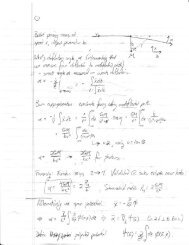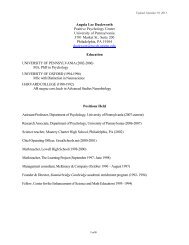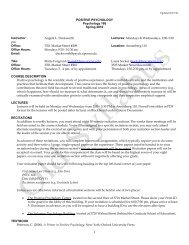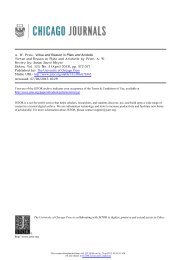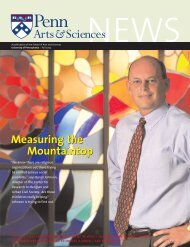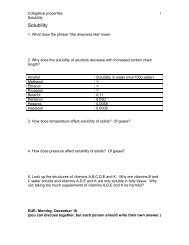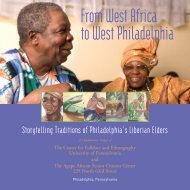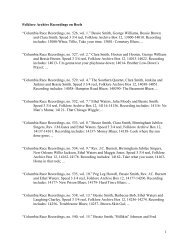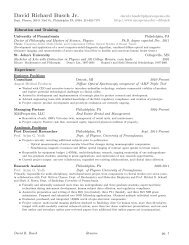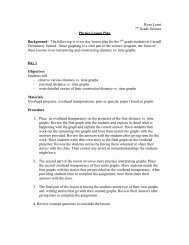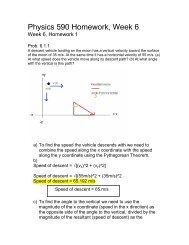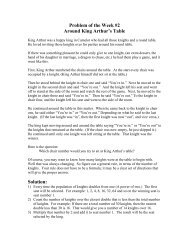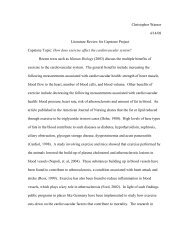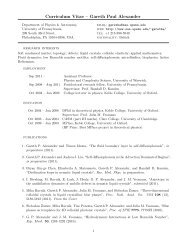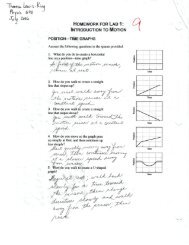PENN SUMMER - University of Pennsylvania
PENN SUMMER - University of Pennsylvania
PENN SUMMER - University of Pennsylvania
Create successful ePaper yourself
Turn your PDF publications into a flip-book with our unique Google optimized e-Paper software.
STaTiSTiCS<br />
sTaT 111 910 MTWr 10:40am–12:15pm aldor-noiman<br />
Introductory Statistics<br />
Fulfills Formal Reasoning Course, Quantitative Data Analysis Requirement<br />
Basic ideas <strong>of</strong> probability and statistics. Statistical methods for the<br />
behavioral sciences, especially psychology. Topics include probability,<br />
estimation, hypothesis testing, regression.<br />
TheaTer arTS<br />
Thar 100 910 Tr 6:00pm–9:00pm Malague<br />
Introduction to Theatre<br />
Fulfills Arts & Letters Sector<br />
What is theatre? For whom—and by whom—is it created and performed?<br />
What does it take to “make theatre?” What is the role <strong>of</strong> theatre<br />
in society and in our culture(s)? This course is an “introduction”<br />
to theatre as a unique art form. We will learn to read plays not merely<br />
as pieces <strong>of</strong> literature, but as scripts designed for performance. This<br />
summer, live viewing <strong>of</strong> plays in production will be a special feature<br />
<strong>of</strong> the course, as our class schedule will facilitate group visits to<br />
Philadelphia theatres. Among the productions we will see and study<br />
are Stephen Sondheim’s Sunday in the Park with George at the Arden<br />
Theatre; August Wilson’s Ma Rainey’s Black Bottom at the Philadelphia<br />
Theatre Company; and Vaclav Havel’s Leaving at the Wilma Theater.<br />
We will examine the roles <strong>of</strong> actor, director, designer, and playwright;<br />
we will look back at moments in the theatrical past—and<br />
forward to new ways <strong>of</strong> thinking about performance. The course will<br />
also include conversations with pr<strong>of</strong>essional practitioners and a “behind-the-scenes”<br />
look at theatre in Philadelphia.<br />
UrBan STUDieS<br />
urBs 203 910 MW 4:30pm–7:40pm gorostiza<br />
Introduction to City Planning<br />
This course will provide a general introduction to the concepts and<br />
practice <strong>of</strong> city planning. Topics to be discussed include: the process<br />
and nature <strong>of</strong> planning—theories, methods and roles as manifested<br />
in practice; history and trends in city planning; functional planning<br />
practice; planning within constraints—a field project; planning in the<br />
international arena; present crisis in planning.<br />
urBs 220 910 Tr 1:00pm–4:00pm lamas<br />
Democratic City and Sustainable Development<br />
In an era <strong>of</strong> market-driven anomie, can we find successful ways <strong>of</strong> living<br />
with personal dignity and social purpose? How can our concerns<br />
and critiques regarding hierarchies <strong>of</strong> power be oriented towards<br />
the generation <strong>of</strong> alternative, practical strategies for urban development?<br />
What can we learn by searching philosophically, historically,<br />
and globally? What principles, policies, and programs—secular and<br />
religious—actually promote democratic, sustainable cities? We will<br />
situate our inquiry at the intersection <strong>of</strong> theory and practice in a<br />
consideration <strong>of</strong> capitalism, globalization, urbanization, gender and<br />
racial inequality, social welfare, public health, human rights, environmentalism,<br />
and economic democracy.<br />
urBs 390 910 Tr 9:00am–12:00pm nairn<br />
Urban Agriculture<br />
Urban agriculture is a growing global trend. This course examines<br />
urban agriculture as an issue <strong>of</strong> sustainability, social justice, public<br />
health and vacant land. It explores the potential <strong>of</strong> urban agriculture<br />
in both the Global North and South to provide a safe and secure<br />
source <strong>of</strong> food to city residents. Major topics include sustainable agricultural<br />
practices; operational and spatial requirements; distribution<br />
systems and access to fresh food. Using Philadelphia as a laboratory,<br />
the course explores its robust agricultural scene <strong>of</strong> community gardens,<br />
guerilla gardens, and entrepreneurial farms, as well as its distribution<br />
system including programs such as City Harvest, the emerging<br />
Common Market and established farmers’ markets. The course<br />
will integrate lectures about sustainable agricultural practices with<br />
field trips to and hands-on work at community gardens and farms.<br />
urBs 457 910 Tr 5:00pm–8:10pm Von Mahs<br />
Globalization and Comparative Urban<br />
Development: Globalization and the Welfare<br />
State<br />
Crosslisted with: SOCI 435 910<br />
This seminar will explore the impact <strong>of</strong> economic globalization on<br />
welfare states in North America and Europe. Specifically, this course<br />
will provide a systematized account <strong>of</strong> how different welfare regimes<br />
respond to global economic restructuring processes and thereby produce<br />
different outcomes in the protection <strong>of</strong> their citizens against<br />
social risks.<br />
Summer Session ii<br />
JULY 6–AUgUST 13, 2010<br />
anCienT hiSTorY<br />
anCh 026 920 MTWr 2:40pm–4:15pm gieske<br />
Ancient Greece<br />
Fulfills History & Tradition Sector / Crosslisted with: HIST 026 920<br />
The Greeks enjoy a special place in the construction <strong>of</strong> western culture<br />
and identity, and yet many <strong>of</strong> us have only the vaguest notion <strong>of</strong><br />
what their culture was like. A few Greek myths at bedtime when we<br />
are kids, maybe a Greek tragedy like Sophokles’ Oidipous when we<br />
are at school: these are <strong>of</strong>ten the only contact we have with the world<br />
<strong>of</strong> the ancient Mediterranean. The story <strong>of</strong> the Greeks, however, deserves<br />
a wider audience, because so much <strong>of</strong> what we esteem in our<br />
own culture derives from them: democracy, epic poetry, lyric poetry,<br />
tragedy, history writing, philosophy, aesthetic taste, all <strong>of</strong> these<br />
and many other features <strong>of</strong> cultural life enter the West from Greece.<br />
The oracle <strong>of</strong> Apollo at Delphi had inscribed over the temple, “Know<br />
Thyself.” For us, that also means knowing the Greeks. We will cover<br />
the period from the Late Bronze Age, c. 1500 BC, down to the time<br />
<strong>of</strong> Philip <strong>of</strong> Macedon, c. 350 BC, concentrating on the 200-year interval<br />
from 600–400 BC.<br />
<strong>SUMMER</strong> SESSIOn II • JULY 6–AUgUST 13, 2010 27



